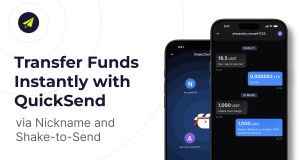Top Crypto Business Ideas for 2024

The cornerstone of any successful crypto project lies in its idea. Ideally, it should address a current need, stand out with its uniqueness, and have lasting appeal.
On this page
The market has seen a plethora of projects emerge over the past 15 years. Giants like Ethereum, Bitcoin, and Solana continue to thrive, yet many projects have faded away within a year of their inception, often due to the foundational idea's lack of sustainability.
Entrepreneurs need to anticipate the future: identifying which market segments will evolve, which blockchains will gain popularity, and which ecosystems will expand. We've pinpointed some of the most pertinent business ideas for 2024 to guide budding entrepreneurs.
Creating a Decentralized Exchange (DEX)
A DEX is an online platform that enables users to buy, sell, and trade cryptocurrencies and stablecoins directly with one another. There are primarily two types: those based on automated market makers (trading via an algorithm) and those utilizing an order book (where users trade amongst themselves).
Given that the big players have already carved out their market share, entrepreneurs might find it more fruitful to focus on creating DEXs within emerging ecosystems such as:
This strategy echoes the “blue ocean strategy,” targeting ecosystems still devoid of significant competition. It offers entrepreneurs an opportunity to be among the first movers and secure substantial profits.
Launching a Crypto Payment Gateway
According to the analytics service Statista, the number of cryptocurrency users is expected to reach 994 million by 2027. Clearly, there's a need for a mechanism to make cryptocurrencies readily usable for purchasing goods and services.
Crypto Market Growth by 2027. Source: statista.com
The most fitting solution is a crypto payment gateway. This intermediary platform facilitates a direct exchange route for cryptocurrencies to fiat currencies.
Here's a concise list of essentials for creating such a gateway:
- An API for business owners to integrate the crypto payment gateway into their website;
- Integration with WooCommerce (a plugin used for building e-commerce websites on WordPress);
- An intuitive and feature-rich design.
Major crypto payment gateways like Whitepay, CoinPayments, BitPay, etc., can serve as benchmarks. You could model the functionality and operational principles of your gateway after these industry leaders, focusing on a specific niche market (adhering to the blue ocean strategy).
Creating an NFT Marketplace
Non-fungible tokens (NFTs) are unique digital identifiers that validate ownership of various assets, including art, videos, music, etc. Deployed on the blockchain, NFT transactions also necessitate blockchain interaction for exchanges, purchases, or sales.
NFT marketplaces serve as intermediaries where sellers and buyers can more easily find each other. These platforms allow artists to showcase their work, create collections, and choose their sales format (auction, direct sale, etc.).
Major NFT marketplaces include:
- Blur;
- Tensor;
- OpenSea.
Although NFTs peaked in popularity in 2021, demand for these assets persists. On average, daily trading volumes across all NFT marketplaces range from 10 to 15 thousand ETH.
Average Trading Volumes Across all NFT Marketplaces. Source: defillama.com
Blur, operating on the Ethereum network, captures a significant market share. While competing with such a titan is possible, if the business goal is to generate revenue, developing a marketplace on newer, less saturated blockchains may be more advantageous.
Developing an On-Chain Analytics Platform
The surge of new tokens, networks, and market participants makes data analysis via blockchain explorers increasingly challenging. Investors prefer dedicated on-chain analytics platforms like Arkham and Nansen.
On-chain analytics involves searching and processing information about the state of the blockchain, including:
- Asset movements;
- Wallet interactions;
- Tracking major players' actions.
Entrepreneurs could either aim to cover multiple sectors (DeFi, NFT, SocialFi) in on-chain analytics at once or focus on creating niche solutions for specific networks, tokens, or ecosystems.
One straightforward yet effective idea is to create a Telegram bot integrated with Etherscan to fetch the necessary information. In on-chain analytics, users are often interested in the wallet states of major token holders, looking for:
- Current balance;
- Balance 7 days ago and the difference (delta);
- Balance 30 days ago and delta;
- Date of the first token purchase.
This helps to understand whether a token is being accumulated, distributed, or held.
Monetization could be through a monthly subscription or a fixed fee for a set number of queries. The developers' task is to integrate the bot with Etherscan and decide how user queries should be formatted (e.g., by entering a smart contract address or token ticker).
Creating Blockchains
Blockchain is a decentralized database not only utilized in finance but also in healthcare, logistics, and education, among other fields. Any company needing to store any form of data could use blockchain.
Industries that Use Blockchain Technology. Source: antra.com
The demand for blockchain as a data storage solution is expected to grow due to its primary benefits:
- Decentralization: Information is distributed across numerous nodes.
- Security: The distributed structure of the network minimizes the risk of a single point of failure.
- Immutability: Each block in the network is connected to the previous one, complicating data alteration efforts.
If blockchain adoption becomes widespread, companies will need specialists capable of meeting their demand for a proprietary distributed ledger. Thus, by establishing a position among blockchain developers now, entrepreneurs can potentially enjoy significant future benefits.
The content on The Coinomist is for informational purposes only and should not be interpreted as financial advice. While we strive to provide accurate and up-to-date information, we do not guarantee the accuracy, completeness, or reliability of any content. Neither we accept liability for any errors or omissions in the information provided or for any financial losses incurred as a result of relying on this information. Actions based on this content are at your own risk. Always do your own research and consult a professional. See our Terms, Privacy Policy, and Disclaimers for more details.





























